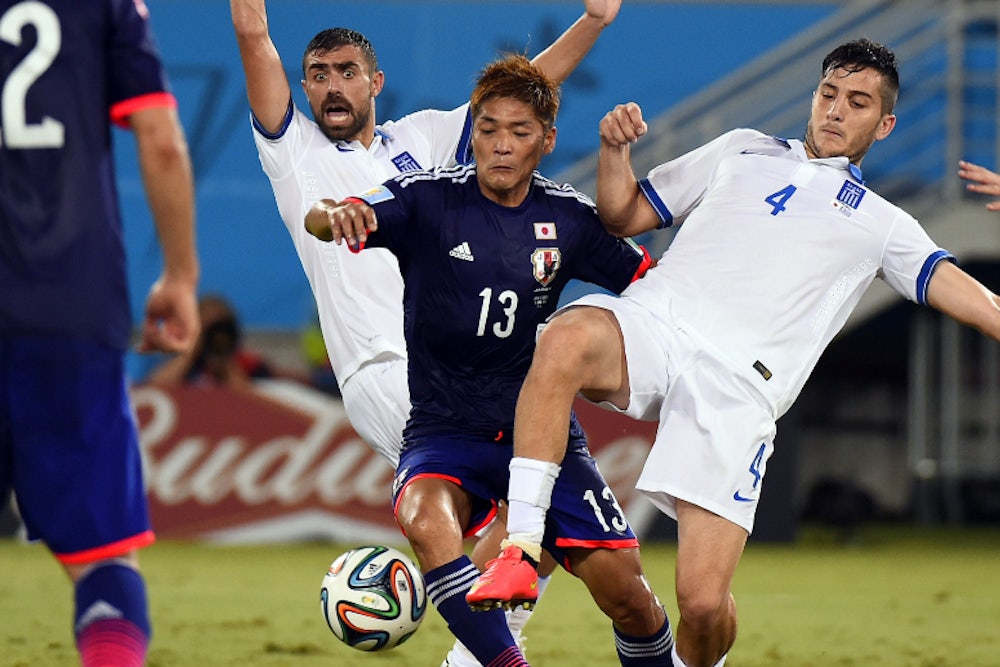It has, by all accounts, been a terrific World Cup so far. From Costa Rica’s fairy tale run and Guillermo Ochoa’s epic goalkeeping against Brazil to the rampant French and the scattered Spaniards, it has been sprinkled with shocking upsets, it has consecrated new soccer heroes and delivered glorious spectacle.
The cornucopia of goals reminds me of the last World Cup to be held in a Latin American country: Mexico ’86, that first one I can properly remember. It was Maradona’s tournament, but also that of Platini and Careca, Ceulemans and Belanof, Butragueno and Lineker. In Mexico, where the Danes clobbered Uruguay 6-1 in the group stage only to be humiliated 5-1 by Spain in the round of 16, where the Belgians beat the USSR 4-3 in extra time to make it to the quarter-finals, and the final featured five goals. An average of 2.54 goals were scored in every match that year. Counting Friday’s matches, this World Cup’s average is a whisker under three per encounter, for a total of 65 so far.
None of these goals have been scored by Greece. In its second game on Thursday (after midnight local time), the Greeks drew 0-0 with Japan, in what was one of the least exciting contests of the tournament. The Japanese had possession of the ball more than two thirds of the time and fired more than twice as many shots on target, but to no avail. As for the Greeks, they had few opportunities and were relieved to escape the tie with their first point. In eight World Cup appearances in their history, they have only managed two goals.
But Greek fans, who have long abandoned hope of soccer artistry from their national side, turned off their TV sets in the early morning of Friday somewhat encouraged. Greece is still in with a chance to make it to the knock-out stage. If they beat the Ivory Coast on Tuesday and Japan fails to defeat Colombia, they will advance.
Beyond the tricky but not impossible arithmetic, Greeks were also heartened by the way in which their national team fought its way through the match. Everything went wrong for them against Japan. Greece’s most talented striker, Kostas Mitroglou, in keeping with his recent string of bad luck, was injured and had to leave the pitch in the 34th minute. Four minutes later, team captain Kostas Katsouranis received a second yellow card for a thoughtless tackle and was sent off.
Instead of making them buckle, the blow seemed to rejuvenate the Greeks. Yorgos Karagounis, a veteran of the Euro 2004 triumph, and still an impressive force at 37, was brought in to fortify the midfield and to stiffen the backbone of his fellow players. It worked. It was the Greeks, rather than Japan, that came closest to scoring in what remained of the first half when Vassilis Torosidis’s right-foot thunderbolt was denied by keeper Eiji Kawashima. After the interval, the Japanese had the upper hand but the near-flawless performance of the defensive duo of Sοcrates Papastathopoulos and Kostas Manolas (who was clearly in pain in the last few minutes) and the goalkeeping heroics of Orestis Karnezis) made sure that, for the first time ever, Greece would end a World Cup tie without conceding a goal.
Asked what the Greek team needed to do differently in its last game against the Ivory Coast, coach Fernando Santos did not go for overwrought analyses: “We need to win,” he said. He could have added that to do so we need to score. It won’t be Maradona or Careca, Messi or Benzema—but it needs to happen.
Still, Greece remains alive in the 2014 World Cup. This will not make many—perhaps not any—non-Greek soccer fans leap with anticipation. But it is another example of the team doggedly refusing to die when its back is up against the wall. In that sense, it is evocative of the painful process through which Greece has managed to stay in the Eurozone, even when everyone thought it was on its way out. Like its continued membership of the single currency, its path through the group stage has been pretty ugly. But in football, as in life, beauty will only get you so far.
